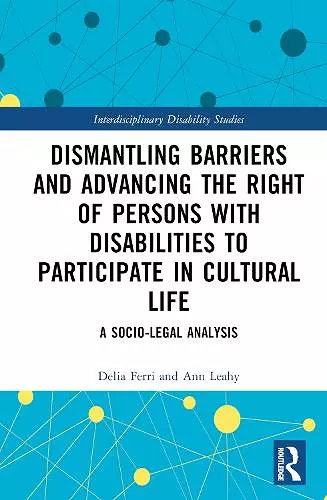Dismantling Barriers and Advancing the Right of Persons with Disabilities to Participate in Cultural Life
A Socio-Legal Analysis
Delia Ferri author Ann Leahy author
Format:Hardback
Publisher:Taylor & Francis Ltd
Published:18th Feb '25
Currently unavailable, and unfortunately no date known when it will be back

The right to participate in cultural life is profoundly rooted in international human rights law, and, with regard to persons with disabilities, it is enunciated in Article 30 of the UN Convention on the Rights of Persons with Disabilities (CRPD or the Convention). This provision requires States Parties to the Convention to ensure accessibility of cultural materials, services and activities, and cultural heritage, and to support the creative and artistic potential of persons with disabilities. However, people with disabilities continue to face barriers to cultural participation.
On foot of a pan-European empirical study and a socio-legal analysis, this book discusses the normative content of Article 30 CRPD and its implementation. It identifies and categorises barriers to cultural participation, highlighting new paths to operationalise Article 30 CRPD.
This book will be of interest to scholars and students working in disability law, socio-legal studies, international human rights law, as well as cultural studies, disability studies, and cultural policies.
This exciting new volume reveals new ways of understanding the right to participate in culture as envisioned by Article 30 of the Convention on the Rights of Persons with Disabilities. Constructed around the human right-based model of disability, the sociolegal studies chart the variable distance between the vision of Article 30 and the experiences of persons with disabilities when exercising their legal right to culture though arts practice and heritage. These dynamic studies chronicle the triumphs and challenges experienced by rights holders. Ultimately, this book reveals that despite the positive impacts the first fifteen years of the CRPD, there is still an uphill battle to ensure all people with disabilities are able to engage and exercise their rights.
Dr Kasey McCall-Smith, Edinburgh Law School - University of Edinburgh
This much-needed book is an example of outstanding scholarship at the intersection of Socio-Legal Studies and Disability Studies. Grounded on careful legal and empirical analysis, it deepens understanding of, and advances debates about, the human right of disabled people to participate in cultural life, most notably articulated in Article 30 of the UN Convention on the Rights of Persons with Disabilities. This is a right which has generally been somewhat neglected by researchers, despite the evident significance of its implications for all disabled people – in connection with both our enjoyment of the artistic and cultural works of others and our own creation of such works. The book is beautifully crafted and highly readable, written in a style that is both elegant and accessible. It sparkles with ideas and is meticulously referenced, drawing on an impressive range of sources. A must-read for anybody interested in the interface between disability and culture, this book will also have relevance and appeal to scholars and practitioners working more broadly in fields such as disability and human rights, and inclusive and accessible art and culture.
Prof. Anna Lawson, School of Law - University of Leeds
This book provides an original and thorough analysis of the right to participation in culture for persons with disabilities. The authors have succeeded in developing a unique perspective by adopting a socio-legal perspective and looking at various forms of cultural participation across a wide range of countries and types of impairments. Combining insights from legal scholarship, cultural studies and disability studies, and combining traditional legal doctrinal methodology with qualitative data analysis, the authors present a novel approach to the study of the rights of persons with disabilities. The book provides new knowledge about the links between the legal obligations stemming from the CRPD, the official accounts of States Parties, and the lived experiences of persons with disabilities. Empirically the book advances the state of the art by analysing factors that foster or hamper the cultural participation of persons with disabilities. The book constitutes a must read for all those interested in how to foster the rights of persons with disabilities.
Prof. Rune Halvorsen, Faculty of Social Sciences – Oslomet
ISBN: 9781032602295
Dimensions: unknown
Weight: 520g
182 pages